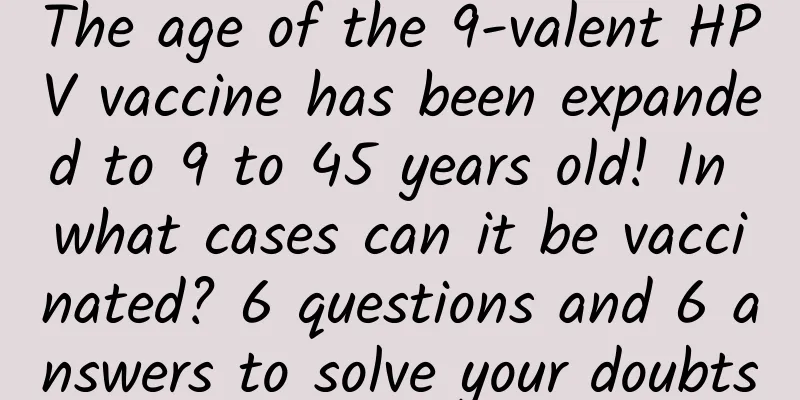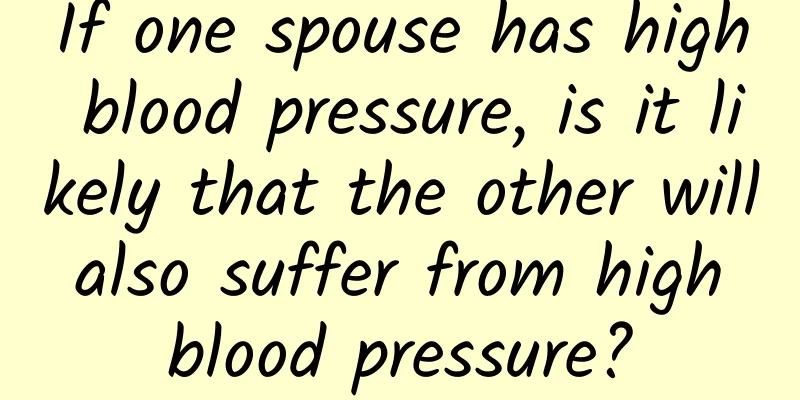The age of the 9-valent HPV vaccine has been expanded to 9 to 45 years old! In what cases can it be vaccinated? 6 questions and 6 answers to solve your doubts

|
Recently, the new indication for the nine-valent human papillomavirus (HPV) vaccine was approved by the China National Medical Products Administration, and the eligible female age group has been expanded from 16 to 26 years old to 9 to 45 years old . Suddenly, the situation became tense again. The nine-valent vaccine remains unchanged, but why has the age range become wider? Are there any safety risks? Can people who have received the two-valent or four-valent vaccine before be given the nine-valent vaccine? This article provides answers to a series of hotly debated questions. 1. HPV and its vaccine HPV is a non-enveloped double-stranded DNA virus that can cause squamous epithelial proliferation in human skin and mucous membranes. Currently, more than 200 HPV subtypes have been identified, which can be divided into high-risk and low-risk types according to their carcinogenicity. Among them, high-risk HPV can cause vaginal and cervical intraepithelial lesions and is an important cause of cervical cancer. HPV vaccine, as an important part of the HPV protection strategy, mainly induces the body's humoral immune response. The neutralizing antibodies produced can bind to viral antigens when HPV enters the body, thereby preventing HPV infection. Relevant studies have confirmed that HPV vaccines have a protective efficacy of 87.3% to 100.0% in clinical trials for preventing HPV-related diseases. 2. Why can the nine-valent HPV vaccine be administered to a wider age group? The appropriate vaccination age for the HPV nine-valent vaccine approved abroad is 9 to 45 years old, but clinical research in China has not been completed before, so the age limit is 16 to 26 years old. At present, many nine-valent HPV vaccines in China have entered Phase III clinical trials, and clinical research data from China is available . Studies have found that the immunogenicity of women aged 9 to 15 and 27 to 45 is consistent with that of people aged 16 to 26, and can have the same protective effect. Therefore, the applicable age can be expanded to 9 to 45 years old. 3. Can people who have previously received the bivalent or quadrivalent HPV vaccine continue to receive the nine-valent vaccine? The instructions for the HPV 9-valent vaccine point out three points. 1. If this product is needed after completing 3 doses of quadrivalent HPV vaccine, it should be started at least 12 months later and the vaccination should be 3 doses. 2. There are currently no clinical research results to support whether the nine-valent vaccine can be given after the two-valent HPV vaccine. 3. Regarding whether it is possible to switch to the nine-valent HPV vaccine during the course of bivalent or quadrivalent HPV vaccination, there is currently no clinical data to support the interchangeable use of this product with other HPV vaccines. IV. How should high-risk and special populations receive HPV vaccination? 1. Situations in which vaccination is recommended (1) Vaccination is recommended for all women of appropriate age regardless of whether they have HPV infection or cytological abnormalities. (2) It is recommended that women of appropriate age who have had high-grade cervical squamous intraepithelial lesions but have received ablative or resective treatments should be vaccinated. Further research is needed to confirm whether HPV vaccination is beneficial after cervical cancer treatment. (3) Vaccination is recommended for women of appropriate age who have a history of anal intraepithelial neoplasia, especially those at high risk of anal squamous cell carcinoma. (4) Priority is given to vaccination for women of appropriate age who have genetic susceptibility site mutations (HLA-DPB2, EXOC1 and GSDMB gene mutations, etc.). (5) It is recommended that women of appropriate age who have high-risk lifestyles be vaccinated as early as possible, such as early sexual activity, multiple sexual partners, and long-term use of oral contraceptives. (6) It is recommended for women of appropriate age with impaired immune function, such as HIV-infected people, patients with autoimmune diseases, and patients with type 1 and type 2 diabetes. 2. Situations where vaccination is not recommended (1) Preventive vaccination is not recommended for pregnant women. If you are planning to become pregnant in the near future, it is recommended to postpone vaccination until after the breastfeeding period. If you become pregnant unexpectedly after vaccination, you should stop the uncompleted doses of vaccination, but those who have completed the vaccination do not need to intervene. (2) Although clinical trials have not yet observed the secretion of serum HPV antibodies in breast milk, since many drugs can be secreted in breast milk and there is a lack of safety research data on HPV vaccination in breastfeeding women, vaccination is highly recommended for breastfeeding women. 3. Vaccination based on individual circumstances (1) Patients who take immunosuppressants for a long time after organ/bone marrow transplantation can discuss with their doctors and receive individualized advice based on the severity of the disease. (2) Patients with renal failure receiving hemodialysis can discuss with their doctors and receive vaccination if their physical condition permits. Summary: The recommended levels of HPV vaccination for special populations (females) are shown in Table 1. Table 1 Recommended levels of HPV vaccination for special populations (females) 5. Can men **** get HPV vaccine **** Men can get the HPV vaccine. Even though men have a lower risk of persistent infection with high-risk HPV than women, they can still develop diseases such as penile cancer, anal cancer, or genital warts due to HPV infection. It should be noted that due to the shortage of HPV vaccines in my country, HPV vaccination is not yet available to men. 6. Will there be a 14-valent HPV vaccine soon? At present, the domestic 14-valent HPV vaccine has entered the phase III clinical trial stage. It is reported that the 14-valent HPV vaccine covers all 12 high-risk cancer-causing HPV virus types announced by the World Health Organization and 2 HPV virus types that mainly cause genital warts. Compared with the imported nine-valent vaccine, it provides protection against five additional virus subtypes and will be used to prevent cervical cancer, genital warts, etc. caused by HPV infection. In short, cervical cancer is a major disease that affects the health and safety of Chinese women. HPV vaccination is a basic and key task in the prevention and treatment of cervical cancer. It is particularly important to grasp the prevention period and effective daily protection . It is recommended that women of appropriate age receive HPV vaccination as early as possible. References: Chinese Society of Gynecologic Oncology, Chinese Society of Eugenics, Colposcopy and Cervical Pathology. Chinese expert consensus on the clinical application of human papillomavirus vaccine[J]. Chinese Journal of Medical Frontiers (Electronic Edition), 2021, 13(2): 1-12. Text丨Tan Tai Yi Ran |
<<: Correctly relieve dry eyes, 80% of people do it wrong
>>: If myopia degree is greater than 600 degrees, can I not have surgery?
Recommend
Use Chinese herbal incense to disinfect and prevent virus invasion!
The Chinese medicine shop was filled with light s...
How to use the vaginal muscle trainer?
My sister just gave birth to a baby not long ago....
The order of makeup application steps
Nowadays, more and more women will wear makeup wh...
What should women eat to improve menopause
Menopause is a very normal physiological stage. E...
What can be added to egg white to replenish water? What can be added to milk to replenish water?
People with oily skin can replace moisturizing lo...
What should I do if I gain weight after giving birth?
Obesity is almost the most annoying phenomenon in...
How many days is it normal to delay menstruation?
Nowadays, more and more women are suffering from ...
Can I test for pregnancy with only my morning urine?
Pregnancy is great news for newlyweds, as it mean...
What harm does conversion from vaginal delivery to cesarean section cause to the mother?
Childbirth is a stage that every woman must go th...
How to relieve stomach pain during pregnancy
What women worry about most after becoming pregna...
Superconducting painless abortion technology advantages
Many people are not familiar with painless aborti...
How to treat left side waist pain in women
For many female friends who stay in the office fo...
What to do if pregnant women have dry stools due to internal heat
The phenomenon of dry stool in pregnant women is ...
How to regulate Yin-Cold Constitution? Recommended by an old Chinese doctor
Many people believe that everyone's physical ...
What's in the Super Supreme Pizza? Ingredients for making pizza
Pizza originated in Italy. It is made of fermente...









